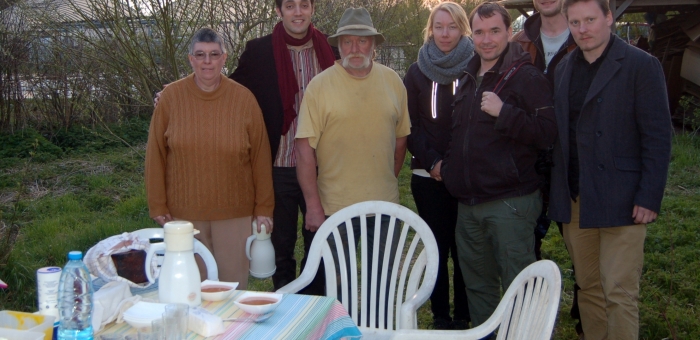Building regional produce supply chains: Logistics for short circuit agriculture
Notes of the PGS dialogue during the GRUNDTVIG meeting in Leuven, Belgium, 1.4.2014

Notes taken by Philipp Weckenbrock from Die Agronauten
The session took place at the Youth Hostel in Leuven with 18 participants from different countries and organisations.
Wim Merckx from Voedselteams started off with a brief word on terminology: there are different terms in use, such as CSA, AMAP, short supply chain schemes, etc. that have much in common. However, the diversity of terms in use can be confusing. Some of these terms and the concepts behind them are explained in more detail in a study of Die Agronauten and partners (‘Community Supported Agriculture: An overview of characteristics, diffusion and political interaction in France, Germany, Belgium and Switzerland’) that can be downloaded from www.agronauten.net. Wim will also make the study available on the Voedselteams website.
First presentation by Thibault Marbot on the Participatory Guarantee System (PGS)
- PGS was created as an alternative to ISO standards and certifications by third parties, which among others are impersonal and expensive
- PGS is a collective certification scheme based on group visits
- The term PGS was coined at the Torres Meeting in Brazil in 2004
- It is based on shared values, trust, participation and shared learning
Presentation by Peter Volz from Die Agronauten about certification at the Regionalwert AG (RWAG)
- RWAG: a regional network bringing together producers, consumers and investors
- There’s a set of 64 ecological, regional-economic and social indicators that are collected from all enterprises within RWAG and published every year
- RWAG is now looking for ways of making the approach more participative, hence interested in PGS
Presentation by Isabelle Vallette from AMAP Île-de-France about the experciences with setting up a PGS scheme at the AMAP Île-de-France Network
- In the AMAP charter, (organic) certification is not a requirement
- In 2009, a process was started to prepare a PGS for the Isle de France network using questionnaires and working groups. However, after 2 years, the process was abandoned. Beside bureaucratic problems, there was also uneasiness among the board members about a perceived control of the farmers associated with PGS. Also the term ‘System’ was considered to be too administrative and too constraining
- Instead, in 2012, in a redirection of their reflection, the Démarche Participatif de Progrès (Participatory Approach for Progress) was started. In this approach, too, all concerned stakeholders will be involved to contribute to a democratisation and open dialogue in a participatory, non-exclusive way
Presentation by Wim Merckx on discussions about PGS within Voedselteams
For the last 10 years, Voedselteams have used a 5-page questionnaire that farmers had to fill
- This list is now outdated for 3 reasons: 1) it did not evolve over time 2) the process was led by Voedselteams staff 3) there was a strong element of control that was considered as too negative. There was agreement that there should be more emphasis on an educational element
- The Grundtvig programme’s Lyon visit has inspired Voedselteams to look more at PGS schemes. Another source of inspiration are peer reviews between farmers as done by farmers in Holland and some biodynamic farmers (including Ann&Walter) in Belgium. A combination of these two approaches might work for what Voedselteams look for in order to strengthen education and linkages between members and farmers
Overview by Cornelia Kirchner from IFOAM on PGS worldwide
- At the moment, IFOAM are preparing a comparative study on the state of social processes in PGS worldwide. Most likely it will be ready by early May 2014.
- PGS approaches were first used by Nature et Progrès in France in the 1970s
- To date, there are more than 100 PGS schemes in more than 50 countries. More than 60 further initiatives are in the making
- Most of the initiatives are in developing countries
- Each PGS initiative is different
- Typically, a group of farmers define their own standards and procedures
- Benefits of PGS include economic advantages such as access to new markets and social advantages such as the sharing of knowledge and information
- An important element of PGS is the empowerment of farmers e.g. through the participatory definition of norms and standards
- Challenges of PGS include a strong dependence on voluntary work, difficulties to involve consumers and obtaining official recognition
Some points that came up during the discussion after the presentations
- From a farmer’s point of view it might be difficult to educate consumers about farming to a level where there can be a meaningful discussion about agricultural techniques
- At Alter Conso in Lyon, farmers themselves voted in favour of third-party organic certification rather than PGS
- It might be difficult to have mixed farm visits for both fellow farmers and consumers
- Short supply chains that are based on personal connections might not need a guarantee system
Some more links by IFOAM
IFOAM PGS landing page: http://www.ifoam.org/en/value-chain/participatory-guarantee-systems-pgs
PGS Basis: http://www.ifoam.org/en/pgs-basics
PGS Guidelines: http://www.ifoam.org/sites/default/files/page/files/pgs_guidelines_en_web.pdf
Newsletter archive: http://www.ifoam.org/en/pgs-updates
Some interesting PGS Newsletter issues:
http://www.ifoam.org/sites/default/files/_pgs_jan-feb_2014.pdf
http://www.ifoam.org/sites/default/files/page/files/pgs_march_2013.pdf
http://www.ifoam.org/sites/default/files/page/files/_pgs_nov_dec_2012.pdf
http://www.ifoam.org/sites/default/files/page/files/2010-09_pgs_newsletter.pdf
